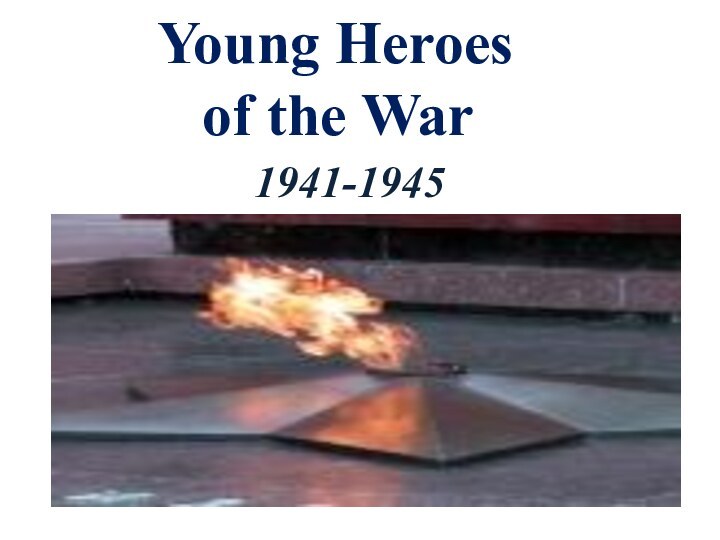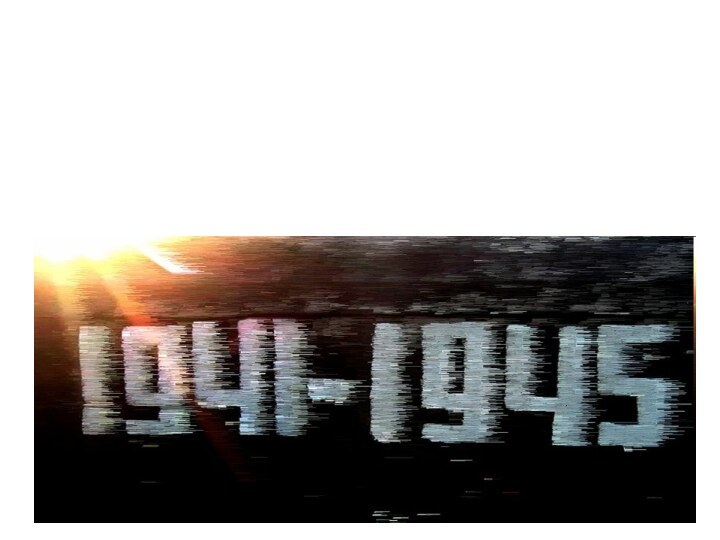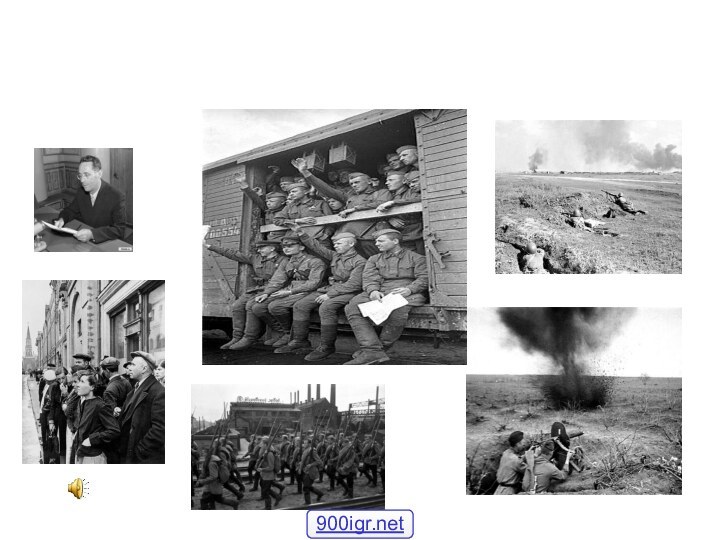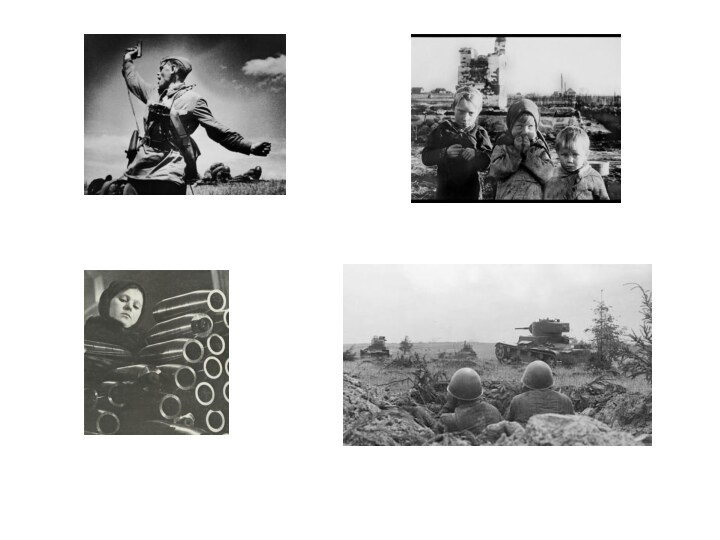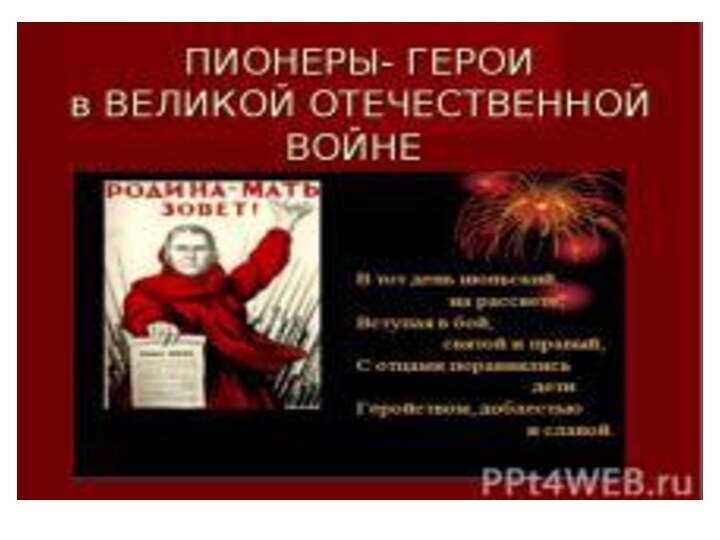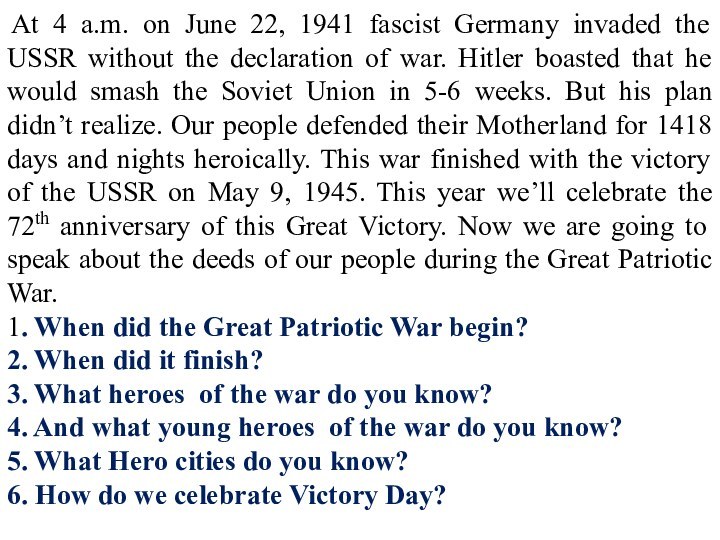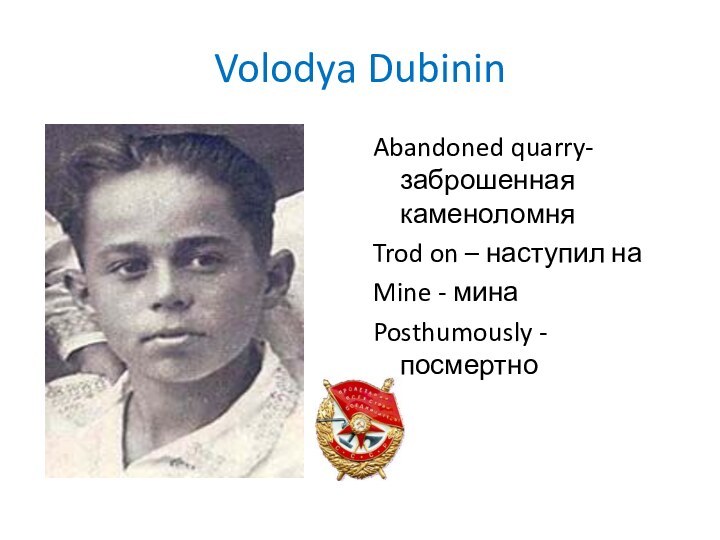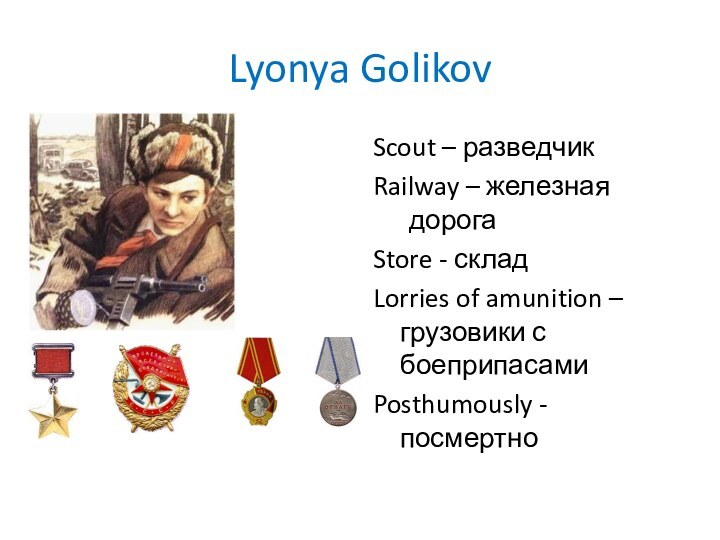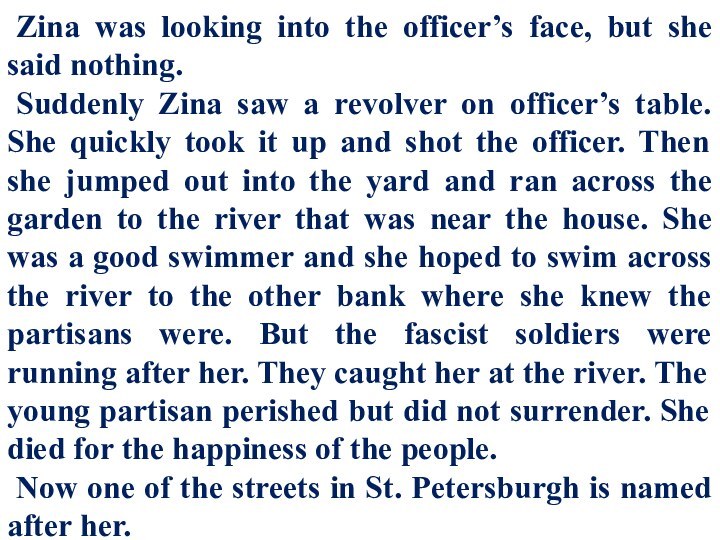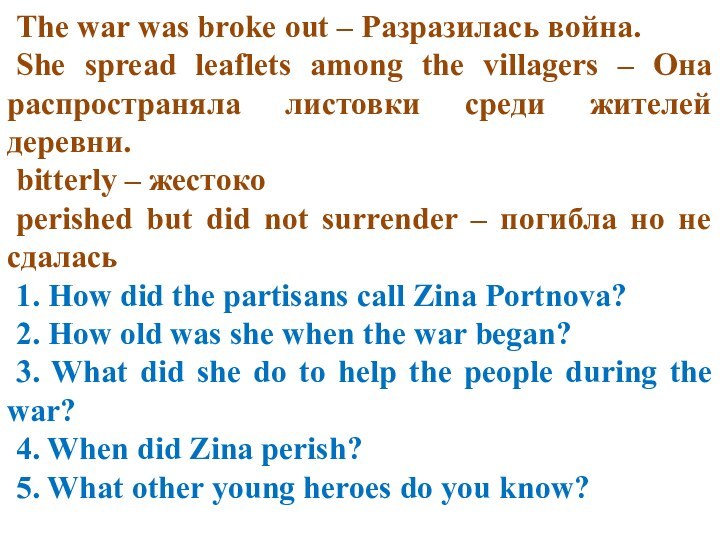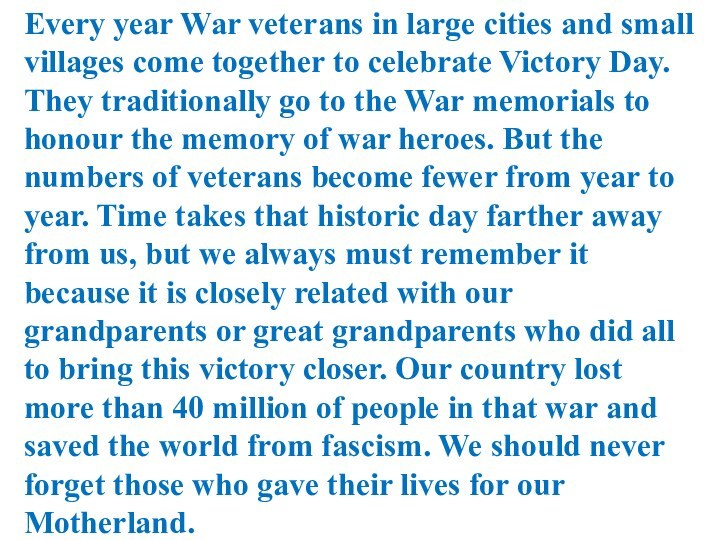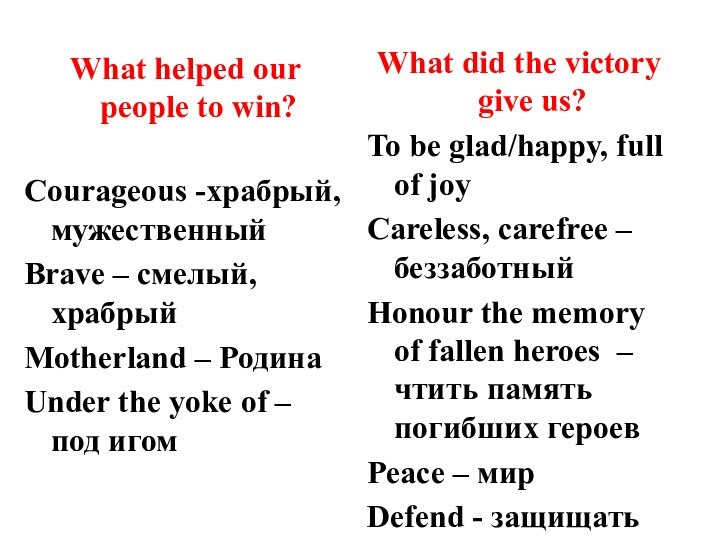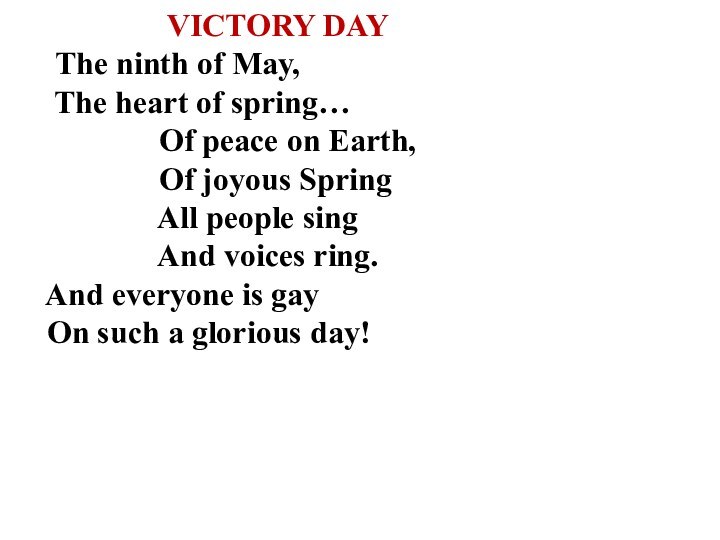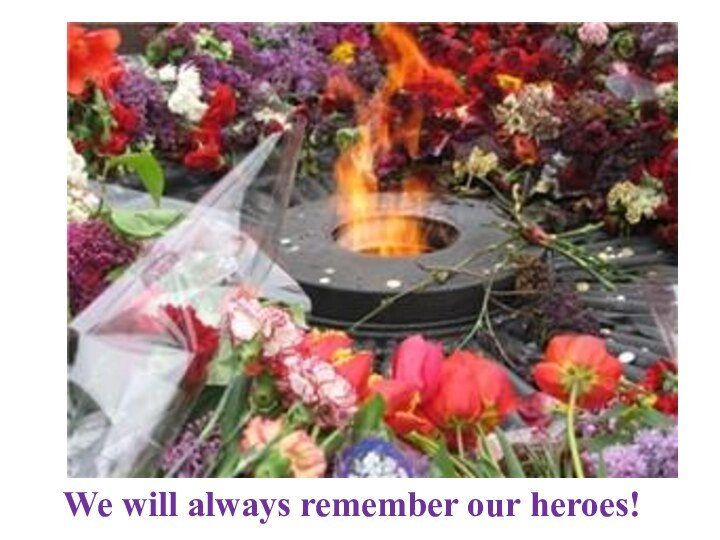Слайд 7
The Great Patriotic War
– Великая Отечественная война
fascist
– фашист
declaration – объявление
anniversary – годовщина
deed – подвиг
enemy – враг
Слайд 8
At 4 a.m. on June 22, 1941
fascist Germany invaded the USSR without the declaration of
war. Hitler boasted that he would smash the Soviet Union in 5-6 weeks. But his plan didn’t realize. Our people defended their Motherland for 1418 days and nights heroically. This war finished with the victory of the USSR on May 9, 1945. This year we’ll celebrate the 72th anniversary of this Great Victory. Now we are going to speak about the deeds of our people during the Great Patriotic War.
1. When did the Great Patriotic War begin?
2. When did it finish?
3. What heroes of the war do you know?
4. And what young heroes of the war do you know?
5. What Hero cities do you know?
6. How do we celebrate Victory Day?
Слайд 9
Young Heroes
Marat Kazey
Wounded – раненый
To cure – лечить
Courage
– мужество
Sabotage – диверсия
Posthumously- посмертно
Сombat merits- боевые заслуги
For Valour –
за отвагу
Слайд 10
Valentin Kotik
Scout – разведчик
To participate – участвовать
Wounded –
раненый
Posthumously - посмертно
Слайд 11
Volodya Dubinin
Abandoned quarry- заброшенная каменоломня
Trod on – наступил
на
Mine - мина
Posthumously - посмертно
Слайд 12
Lyonya Golikov
Scout – разведчик
Railway – железная дорога
Store -
склад
Lorries of amunition – грузовики с боеприпасами
Posthumously -
посмертно
Слайд 13
Zina Portnova
Distribute leaflets – распространять листовки
Sabotage – диверсия
Interrogation
– допрос
Execute – казнить
Jail - тюрьма
Слайд 15
Not only grown-ups defended our country during the
war. There were many young heroes who gave their
lives for the Motherland. One of them was Zina Portnova.
ROMASHKA
Before the war Zina, or Romashka, as the partisans called her, was a school girl. She lived in Leningrad.
When the summer holidays of 1941 came, Zina, who was 14 years old at that time, went together with her younger sister to a village near Vitebsk, to their grandmother. The war broke out. Zina and her sister could not come back to Leningrad. They stayed in the village. Zina decided to do all she could to help her people. Soon she joined a partisan unit.
Слайд 16
Zina was very brave girl. She spread
leaflets among the villagers, she told them about the
heroic fight near Moscow. (p.3)
In 1942 the partisans destroyed the railways and bridges of the enemy and Zina took part in it too. She learned to shoot very well.
The fascist officers were looking for the partisans. In 1943 they caught some partisans. Zina was among them. They beat her, but she didn’t say anything.
“Where are the partisans?” shouted the officer. Zina did not say a word. Again they beat her bitterly and again the officer shouted: “Where are the partisans?”
Слайд 17
Zina was looking into the officer’s face, but
she said nothing.
Suddenly Zina saw a revolver on
officer’s table. She quickly took it up and shot the officer. Then she jumped out into the yard and ran across the garden to the river that was near the house. She was a good swimmer and she hoped to swim across the river to the other bank where she knew the partisans were. But the fascist soldiers were running after her. They caught her at the river. The young partisan perished but did not surrender. She died for the happiness of the people.
Now one of the streets in St. Petersburgh is named after her.
Слайд 18
The war was broke out – Разразилась война.
She
spread leaflets among the villagers – Она распространяла листовки
среди жителей деревни.
bitterly – жестоко
perished but did not surrender – погибла но не сдалась
1. How did the partisans call Zina Portnova?
2. How old was she when the war began?
3. What did she do to help the people during the war?
4. When did Zina perish?
5. What other young heroes do you know?
Слайд 20
What do you know about Victory Day?
Fill in
the words: war, peace, Patriotic, memory, heroes, honour.
1. The
Great … War began in 1941. It was over in 1945. 2. People all over the world were happy when the … was over. 3. The people of the whole world are against war, they want … 4. A lot of Soviet people became real … during the Great Patriotic War. 5. We shall never forget the names of the war heroes, they will live in our … for ever. 6. As a tradition Russian people go to the memorials and monuments to … the memory of the war heroes on Victory Day.
Слайд 21
Every year War veterans in large cities and
small villages come together to celebrate Victory Day. They
traditionally go to the War memorials to honour the memory of war heroes. But the numbers of veterans become fewer from year to year. Time takes that historic day farther away from us, but we always must remember it because it is closely related with our grandparents or great grandparents who did all to bring this victory closer. Our country lost more than 40 million of people in that war and saved the world from fascism. We should never forget those who gave their lives for our Motherland.
Слайд 22
What helped our people to win?
Courageous -храбрый,
мужественный
Brave – смелый, храбрый
Motherland – Родина
Under the yoke
of – под игом
What did the victory give us?
To be glad/happy, full of joy
Careless, carefree – беззаботный
Honour the memory of fallen heroes – чтить память погибших героев
Peace – мир
Defend - защищать
VICTORY DAY
The ninth of
May,
The heart of spring…
Of peace on Earth,
Of joyous Spring
All people sing
And voices ring.
And everyone is gay
On such a glorious day!
